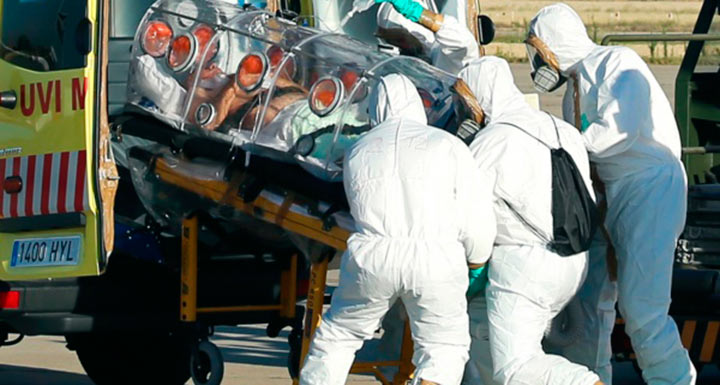
Diseases without borders
This was the week when the Ebola epidemic finally hit home.
Although two American health care workers stricken by the virus had been transported to the United States for treatment weeks ago, one recovered and the other is said to be recovering. This, along with the fact that the overwhelming majority of Americans can’t imagine ever doing what put these two at risk–going to Africa on a humanitarian mission–meant that until now Ebola was something that happened to others. Ebola patients live far away. Or they are Americans who venture to distant lands because of unusually strong religious or moral convictions.
Unlike the AIDS catastrophe, where for years most Americans were almost untouched by the ravages the disease was wreaking in Africa–and in the gay community here–Ebola has broken through the psychological barriers of unconcern relatively quickly.
This is probably because you don’t have to practice certain sexual behaviors (a historically stigmatized ones at that) or regularly stick dirty needles in your arm in order to get Ebola. As recent experience in Africa has shown, all you have to do to contract Ebola is to try to render aid and comfort to a very sick person. An act of consummate humanity thus can become a death sentence.
This is not to say that the international community has responded with anything near the speed and the resources required. So far, as the group Doctors Without Borders has decried repeatedly, the world community has been a day late and more than a few dollars short
At least, however, we have not had to witness the sorry spectacle of the AIDS epidemic, when the drug companies in effect severely rationed life-saving medicines by charging exorbitant prices while millions died. And perhaps most sickening of all, these companies were legally backed by their governments–with the United States in the lead–in their quest to punish anyone who dare manufacture an affordable drug. For years, the right of intellectual property won out over the right to life itself. That was one of those times when capitalism drops its mask of benevolence and shows its ugliest face.
Since there is up to now no drug or cocktail of drugs for Ebola, the drug companies have no way to profit from the misery of the ill. But just wait and see what will happen if they do come up with effective drugs or a vaccine. Judging by the AIDS experience and the astronomical prices pharmaceutical companies are charging for the latest cancer drugs, I am hardly optimistic. In any case, it’s unlikely the big drug companies will come up with anything. Ebola seems a hard nut to crack. Perhaps more importantly, the overwhelming majority of people stricken by Ebola are Africans. Drug manufacturers don’t spend money to research drugs for diseases of the poor.
Meanwhile, Ebola has finally drawn the attention of the U.S. media big time. Ebola has come home. I am sad to say that, for instance, Thomas Duncan, the Liberian patient being treated in a Dallas hospital, may be dead by the time you read this [Ebola patient Thomas Eric Duncan died Wednesday morning (Oct. 8) in a Dallas hospital]. After Duncan’s admission, moreover, it was discovered that one Michael Lively, a homeless man, rode to the hospital in the same ambulance as Duncan. By the time officials found out about it, Lively was nowhere to be found. This set off what the media has described as a “manhunt.” Lively was eventually found. He has a low risk of having contracted Ebola, according to doctors. Just the same, he will be monitored.
In the United States, fear of Ebola seems to be spreading faster than the disease itself. That’s understandable. Ebola is a terrifying disease with a very high mortality rate. People dying of Ebola necessarily have to be denied even the comfort of family members at their bedside. Seemingly every day an Ebola patient is transported from Africa to the United States for treatment. But the bigger problem is that of travelers who might unwittingly carry the disease into the United States. Ebola has no symptoms until it becomes contagious. The early symptoms mimic those of other illnesses. Thus Thomas Duncan was initially sent home from the hospital by clueless medical staff with merely a prescription for antibiotics.
Top public health officials and infectious disease experts nevertheless assure the public that there is a low probability of an Ebola epidemic in the United States. I think, and certainly hope, that they are right. Yet it is less than certain that this will prevent panic. Myriad experiences (Vietnam, Iraq and many more) have taught Americans to be skeptical about the official story. Out of this has come what I think of as “surplus distrust.” No matter how many investigations are conducted into the Kennedy assassination that show Oswald acting alone killed Kennedy or how many scientists say that global warming is real and we are causing it, many Americans don’t believe it.
Meanwhile, the main stage of this tragedy is West Africa. By Sept. 26, the BBC was reporting that more than 3,000 have died. Surely there are many more by now but nobody knows the real toll because of underreporting by families who fear shunning and inadequate epidemiological reporting systems in the affected countries.
Yet the case of Thomas Duncan as well as the other Ebola patients in the United States is a reminder that we are living in a global community. “No man is an island,” wrote John Donne. Yet this country often acts as if it were. Just look at the microscopic level of U.S. foreign aid relative to GDP and compare it with our colossal spending on foreign bases and adventures. Ebola suggests ways through which such twisted priorities may come back to haunt us.

